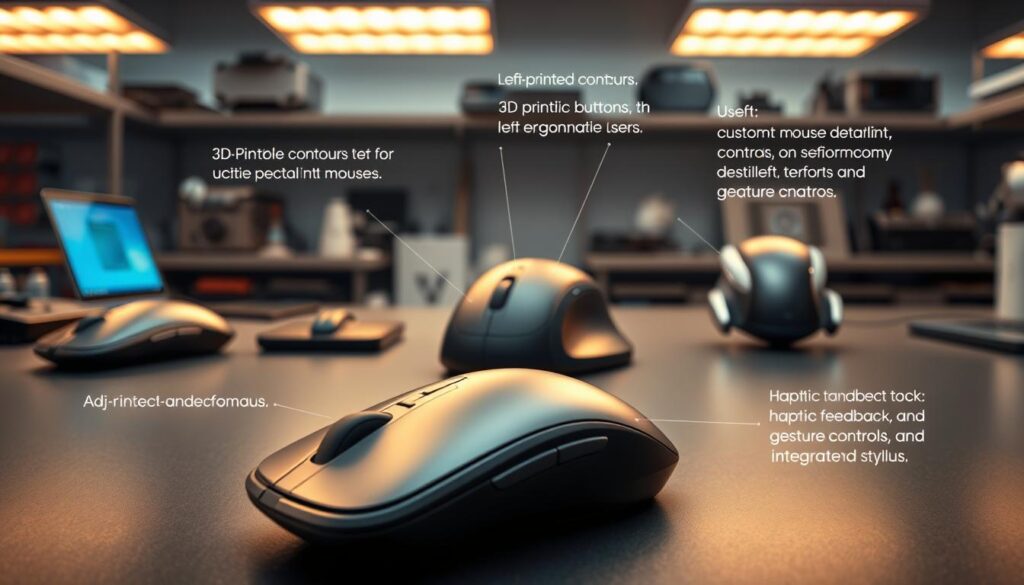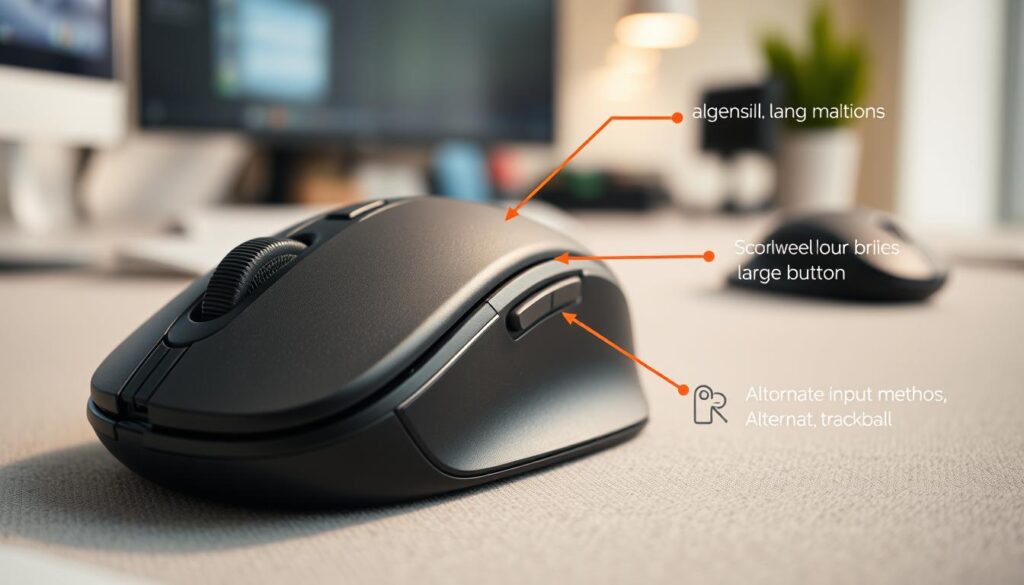Anúncios
Have you ever wondered why left-handed tablet users often struggle with mouse precision during crucial moments in tablet gaming? For gamers who rely on accurate controls, having the right pointing device can significantly enhance both comfort and performance. In this article, we delve into the essentials of optimizing mouse precision for left-handed tablet users.
We explore technological advancements, ergonomic mouse designs, and the unique challenges these users face. Join us as we uncover how addressing these aspects can transform your gaming experience into something seamless and enjoyable.
Anúncios
Understanding Mouse and Pointing Device Technology
Pointing devices are key to using computers. They let users move around and interact with screens easily. These tools turn our hand movements into actions on the screen. This has made computers much better and easier to use.
The Role of Pointing Devices in Computing
Pointing devices, like mice, are vital for many tasks. They help users do simple things and complex tasks alike. Their main jobs include:
- Enabling smooth cursor movement and selection
- Facilitating precise graphic design and editing
- Supporting gaming commands and strategies
- Providing shortcuts for improved workflow efficiency
Evolution of Mouse Design Over Time
The mouse has changed a lot since the 1960s. The first mice were simple but have since become more advanced. Now, they use optical and laser tech for better accuracy.
Anúncios
They also work wirelessly, giving users more freedom. Knowing how mice have evolved helps us choose better ones for our needs.
Types of Pointing Devices Suitable for Left-Handed Users
Finding the right pointing devices for left-handed users can be tough. This is because most are made for right-handed people. Knowing your options can make a big difference in comfort and efficiency. You can choose from special mice for lefties, trackpads, or gaming mice.
Each type has its own benefits for left-handed people. They cater to different needs and preferences.
Comparing Traditional Mice and Alternative Devices
Traditional mice, like those from Logitech, have left-handed versions. The Logitech Signature M650 L and the Logitech Lift Left Vertical are examples. These mice are shaped to fit left-handed hands comfortably.
Trackpads, on the other hand, are great for those who like to use gestures. They’re also easy to carry around. This makes them perfect for tablet users.
Knowing the differences between these devices helps you choose the best one. It depends on what you like and how you use your devices.
Benefits of Trackpads, Styluses, and Gaming Mice
Trackpads and styluses are great for artists and designers. They offer precise control and are easy on the hands. This is perfect for those who need to be exact in their work.
Gaming mice, meanwhile, are designed for left-handed gamers. They have features like programmable buttons and adjustable sensitivity. This makes gaming more precise and fun.
Choosing the right pointing device can boost your performance. It also makes using your devices more enjoyable.
Ergonomic Design Principles for Left-Handed Mice
Ergonomic design is key in tech, especially for left-handed mice. These devices aim to make using them comfortable and reduce wrist strain. A good left-handed mouse fits naturally in your hand, making it easy to use tablets without pain.
Importance of Comfort in Device Selection
Choosing a mouse that’s comfortable is crucial. A left-handed mouse should fit your hand’s shape and movements. This is important for long use, as bad design can cause tiredness. A mouse that feels right in your hand can boost your work and overall experience.
Features that Promote Ergonomics and Reduce Strain
Several features make left-handed mice ergonomic. Here are the main ones:
- Curved Shape: It matches the hand’s natural shape.
- Adjustable Weights: You can change the weight for better control and comfort.
- Quality Materials: They prevent slipping and offer a firm grip.
- Button Placement: Buttons are placed to avoid finger strain.
Devices like the MEETION Left-Handed Mouse and the Perixx PERIMICE-713L have these features. They show how ergonomic design keeps users comfortable and efficient while working.
Boosting Mouse Precision for Left-Handed Tablet Users
For left-handed tablet users, tweaking DPI settings and mouse sensitivity can make a big difference. Knowing how to adjust these settings helps with better control and flexibility. This is true for both work and gaming, where quick reflexes and accuracy are crucial.
Understanding DPI Settings and Sensitivity
DPI, or dots per inch, affects how fast the cursor moves. Higher DPI means quicker cursor movement, great for fast games. Left-handed users should try different DPI levels to find what works best for them.
Adjusting mouse sensitivity along with DPI helps left-handed users find the perfect balance. This balance ensures they have control without losing speed.
Measuring the Impact of Precision on User Experience
Precision is essential for a better user experience, especially in intense gaming. When DPI settings match the player’s reflexes, it boosts comfort and happiness. Left-handed users get smoother navigation and quicker responses with this precision.
Testing different sensitivity levels helps tailor the experience. It makes gaming more enjoyable and personal.
Customizable Features for Enhanced Control
For left-handed tablet users, customizable mouse features are key. They help improve control during tasks. With programmable buttons, users can make their devices fit their needs better. This makes work and play more efficient.
The Advantages of Programmable Buttons
Programmable buttons offer big benefits for many activities. They let users set up shortcuts or commands easily. This makes tasks quicker and easier to do.
- Increases efficiency by reducing the number of clicks needed for actions.
- Enhances gaming experiences with faster response times.
- Allows customization for software tools, making complex tasks simpler.
Using Software to Tweak Mouse Settings
Many modern mice have advanced software settings. This software lets users adjust DPI levels, acceleration, and more. Brands like Logitech and Razer make it easy to customize. This ensures users get the most out of their mouse.
Technological Innovations in Mouse Design
Recent mouse design advancements have changed how we work and play. These changes make tasks easier and more precise. They’re especially good for gaming and graphic design.
Latest Developments in Optical and Laser Tracking
Optical tracking has gotten much better. Now, mice work great on many surfaces. Laser tracking has made it even better.
Users get more sensitivity and speed. This is key for quick tasks. As these techs get better, so does our work.
Wireless Technologies for Improved Flexibility
Wireless mice have become very popular. They use Bluetooth for fast and reliable connections. This means no more cables to get in the way.
It makes our workspaces cleaner and more organized. Wireless tech is perfect for everyone, including left-handed tablet users. It lets them work comfortably and efficiently.

The Importance of Sensory Feedback
Sensory feedback is key to better control and interaction with pointing devices. For left-handed tablet users, it makes a big difference. It includes tactile, auditory, and visual cues that make using a mouse smooth.
How Tactile Responses Enhance Control
The mouse’s surface gives users a sense of their movements. This feedback is crucial for making precise adjustments. It helps users handle the device better and move more accurately.
Auditory and Visual Feedback’s Role in Precision
Auditory feedback, like sounds, confirms that commands are executed. Visual feedback, like the cursor moving, shows immediate responses. Together, they improve precision and control, boosting productivity and satisfaction for left-handed users.
Accessibility Features for Diverse Users
Accessibility features in mice are key for making technology inclusive for everyone. This is especially true for left-handed users. Companies are now making products that are more comfortable for left-handed people.
They offer ergonomic designs and options that can be customized. This lets left-handed individuals interact with their devices more easily.
Special Considerations for Left-Handed Individuals
For left-handed users, the design of a mouse matters a lot. Mice made for left-handed people often have special features. These features make using the mouse more comfortable and efficient.
These products focus on ergonomic design and button placement. They are designed to meet the needs of left-handed users.
Adaptive Technologies and Compatibility
Adaptive technology keeps getting better, offering many options for different needs. It’s important for these technologies to work well with assistive tools like voice recognition. This ensures everyone can use their devices effectively.
Adaptive technology helps left-handed users have a better experience. It does this through designs that are easy to use and intuitive.

Conclusion
Improving mouse precision for left-handed users is key. It involves understanding technology, design, and customization. Left-handed people face special challenges. Finding the right device can make a big difference.
Choosing devices that are comfortable, precise, and easy to use is crucial. Devices with advanced tracking, ergonomic designs, and customizable settings help a lot. They make work and gaming on tablets better for left-handed users.
Technology and gaming peripherals are getting better for left-handed users. Now, they can find devices made just for them. This means they can perform better in all digital tasks.





